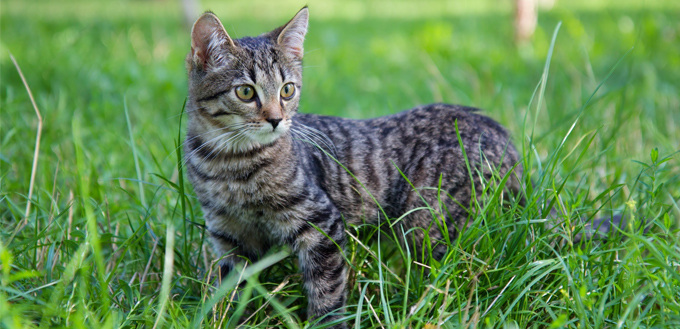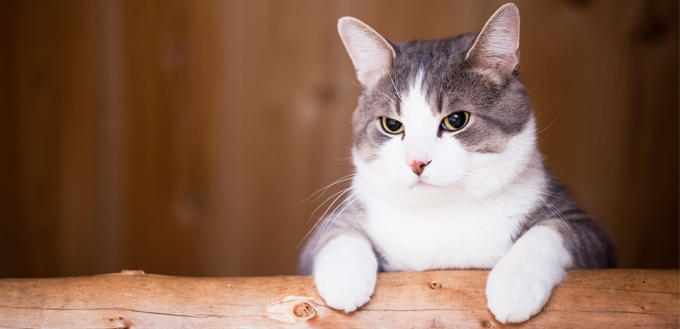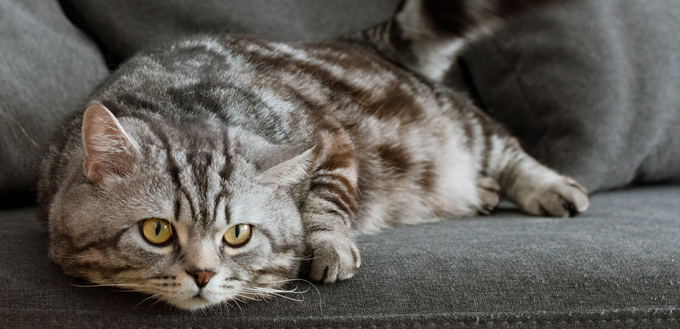It is a question that never fails to catch many veterinarians off-guard. It’s not because they are not knowledgeable about it or that they simply find it absurd. And while you may find yourself scratching your head in disbelief or even in abject curiosity as to the answer to the question, it remains one of the most interesting and highly debatable topics not only in the cat world but also the rest of the animal kingdom. But really, do cats fart?

Do Cats Fart?
When we think of fart the way we people do, we always think about the sound that it creates first. After all, the smell that is also associated with human fart can come from almost any other source. It is for this reason that a lot of folks believe that cats don’t necessarily fart.
Some veterinarians use the apple tree analogy to support the idea that cats do fart. Imagine an apple tree right in the middle of the forest. But since it’s in the middle of nowhere, if an apple falls from the tree it doesn’t mean that it didn’t ‘fall’ simply because we didn’t hear the sound of the apple hitting the ground. Logic and our daily experiences with things tell us that anything that falls – as long as it is heavy enough – will produce a sound upon impact with the ground.
The same is true with cat farts. Just because we don’t hear our cats farting doesn’t mean they don’t. It is either we don’t chance on them farting or it simply isn’t loud enough to be picked up by our ears.
Of course, the telltale sign of cat fart – the sudden change in the scent of air that enters our nostrils – is always a sure sign that they have farted. But even this can be misleading since we may mistake it for something else. We don’t necessarily think that it came from our pet cat for the simple fact that we don’t think they fart.
But they do. A fart is nothing more than the passage of gas trapped in the animal’s intestines. As gas expands and increases in pressure, it has to look for an exit point. There are only two possible exit points in the digestive system – the mouth or the anus. If it comes out through the mouth, we call it belch. If it comes out through the other side of the GI tract, we know it as fart.
So, yes, cats do fart for the simple logic that they have a digestive system and that this can be filled with gas that will need to escape somehow. The next question is why gas forms in this part of the body.
Why Do They Fart?
As we already mentioned, cats do fart. This is because of the formation of gas in their intestines. The question now is why?
Inside the intestines are bacteria, both good and bad. Normally, the bacterial population should have more of the good guys than the baddies. Unfortunately, if the baddies take over or somehow outnumber the good bacteria, then the gas can be formed. Bad bacteria don’t have a role in the digestion of food. In fact, they adversely impact proper digestion so that many of the nutrients found in food are not broken down and absorbed into the blood. When there’s way too many improperly digested food particles in the gut, gas can also form.
It is also possible that the cat will still have a good balance between beneficial and bad bacteria, but its food choices may not be on-the-spot. There are a lot of gas-forming foods on the planet. If a cat consumes any of these food items, then it is possible to produce feline toot. Fiber-rich foods such as some fruits, grains, and vegetables are notorious for producing gas. Dairy products, spicy foods, and even high-fat diets have all been implicated in kitty farts.
Unhealthy dietary practices can also produce fart. Eating too fast can also lead to feline farts. If a cat eats very fast, there’s a tendency that it also swallows large volumes of air which can get trapped inside the gut. Cats also have the tendency to eat almost anything that they find interesting, whether it is spoiled food or even garbage. Hairballs can also make a cat fart.
Related Post: Best Cat Food for Hairballs
You can also contribute to your cat’s farting episodes. For instance, if you change your pet’s food from one brand to another without observing the required transition period, your kitty might end up farting the whole day. It is for this reason that kitties should always be introduced to new cat food on a gradual basis.

When is Feline Farting a Concern?
Occasional farting is perfectly okay for cats. But if it’s turning out to be a very frequent thing for your kitty, it should already raise the red flag. Fart alone will not signal a serious problem. However, if you do notice other symptoms or manifestations from your kitty alongside the kitty toot, then you should always consider the possibility of a more serious health problem.
If you notice your kitty’s tummy to be rumbling even though it has just finished its meal, then there must really be something wrong. The same is true if you notice its tummy to be distended. We know that fart results from gas accumulation in the gut and that it can distend your cat’s tummy, too. But this should not be too pronounced that your cat already looks like it is pregnant.
A more serious concern is when your cat also shows diarrhoea, bloody stools, or even vomiting. These can result in serious electrolyte problems which can lead to weakness and other abnormalities. Bloody stools, while they don’t automatically lead to anemia, can still be a problem if it is profuse enough.
If your kitty seems to have lost its appetite while also farting quite excessively, then you are also looking at a potential problem. Excessive drooling, abdominal tenderness, and even scooting across the floor surface and all indicate some issues that may need the help of a veterinarian to examine further.
Again, if these manifestations are not present and you only smell your kitty’s fart, then it shouldn’t be a cause of concern.
Health Problems Related to Cat Fart
In the preceding section, we focused on the possibility of a serious medical issue if your cat’s farting tendencies are also accompanied by other manifestations. In this section of our smelly and odd yet very interesting topic on cat farts, we will try to look at the most common health problems that are associated with feline fart.
- Inflammatory Bowel Disease
As the name implies, it is already a given that pressure within the bowels or large intestines will also be increased. This can lead to the passage of gas through the cat’s rectum and anus. However, what should be the focus of management is the cause of inflammatory bowel disease in cats. It can be due to the presence of a foreign substance or an injury or insult to the wall of the gut. When this occurs, immune system cells especially eosinophils, neutrophils, plasmacytes, and lymphocytes try to eliminate the problem and lead to the different manifestations of IBD in cats including farting. You can support a healthy gut flora by choosing cat food for ibd.
- Intestinal Parasitism
Roundworms such as Toxocara cati and Toxascaris leonina are very common among cats. There are hookworms, too, such as Uncinaria and Ancylostoma as well as whipworms and tapeworms. But some of the most common causes of kitty fart associated with intestinal parasitism can include Giardia, Isospora, and Toxoplasma gondii. These are protozoa that can produce inflammatory changes in the cat’s gut. These have to be managed using antiparasitic medications as well as other therapies if one wants to eliminate the various symptoms including farting.
- Intestinal Obstruction
Hairballs and the ingestion of large, non-digestible objects can also block the cat’s gut. This increases the pressure in the area before the blockage. If the obstruction is large enough or if it cannot be dissolved through more natural means, the cat may have to be operated on to remove the obstruction.
- Malabsorption Syndrome
There are many potential reasons why cats can have Malabsorption syndrome. It can be due to food allergies, a certain type of enteritis, or even as simple as food intolerance. Cancers such as intestinal lymphosarcoma and adenosarcoma in cats can also lead to Malabsorption. Parasitic and bacterial infections can also produce Malabsorption. Perhaps the most common reason is the lack or insufficient levels of digestive enzymes in the cat’s gut. Because the nutrients are not absorbed through the blood, they remain in the gut and lead to an increase in pressure; hence, you’ve got kitty toot.
- Intestinal Viral Infection
Rotaviruses are the most common culprits when it comes to intestinal viral infections in cats. Other viruses that can wreak havoc in a kitty’s gut and may produce farts are astroviruses, coronaviruses, and parvoviruses. Unlike bacterial and parasitic intestinal infections, there are no antiviral medications for cats. As such, vets are often left with symptomatic management approaches.
- Pancreatic Issues
Exocrine pancreatic insufficiency in cats is always a major concern. While farting itself is not really a problem, the lack or insufficient supply of pancreatic digestive enzymes is. The pancreas has two types of function. One is endocrine where it produces insulin and glucagon and the other is exocrine where the pancreas synthesizes digestive enzymes. If the exocrine functioning of the pancreas is primarily at fault, it is not far-fetched that its endocrine capacity can also be affected in the future.

Preventing Feline Farting
Now that we have a fair amount of understanding of how fart develops in cats as well as the potential health problems that it may signal when taken in light of other manifestations, it’s time to look at how we can help manage this smelly feline proposition or at least prevent it.
First, the diet. If you’ve been feeding your cat high-fiber foods such as fiber-rich dry cat food, then maybe it’s about time you start replacing its food with one that contains lower fiber. Stay away from cat food that has too many carbs as these are excellent sources of fiber. Besides, your kitty was never intended by Mother Nature to chow down on plant food. Only premium-quality, high-protein meats will suffice for the kitty in your life. When replacing its food, do it gradually. Mix a quarter of the new cat food with about three-quarters of its present food and feed this for about a week. The following week, go for a 50-50 split. The week after that, you can create a mix of 25% old cat food and 75% new cat food. After this, you can go with the new food, exclusively.
Second, your kitty feeding practices. Skip the milk, even though a lot of commercials show you just how much cats love licking on their bowl of milk. Go for good old refreshing water instead. It’s a lot friendlier to your cat’s gut than milk or any other dairy product. Don’t feed your kitty human food no matter how much they give you that ‘please-give-me-some’ look. If you have multiple cats, make sure to feed them in their own bowls to help prevent the spread of microbes that can lead to intestinal infections. It may also be wise to feed your kitty smaller feeding portions at more frequent intervals to temper its voracious appetite.
Third, your cat’s activity levels. You want your kitty to move its bowels at a more efficient manner so that gas will have a lower tendency to form inside its gut. Exercise is a must. Your kitty may not be a dog you can walk on a leash, but engaging it in vigorous play can serve as its exercise.
Fourth, keep your household and your kitty’s things spic and span. The litter box should always be cleaned and maintained as bacteria, viruses, and parasites may be present. Garbage should always be disposed of properly and your garbage can be covered securely. If you have leftover food or even food that is already spoiled, make sure that these are also managed properly.
Cats do fart, but maybe not in the way you imagined. While it may be as insignificant as human fart, it can also be a sign of a more serious medical problem. Your vigilance is, thus, required.
Related Post: Best Litter Boxes For Cats
Source:
Note: The advice provided in this post is intended for informational purposes and does not constitute medical advice regarding pets. For an accurate diagnosis of your pet's condition, please make an appointment with your vet.





